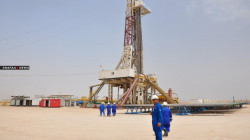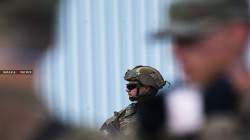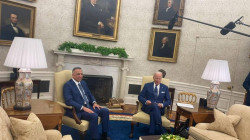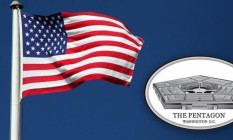What will US combat forces withdrawal mean for Iraq?
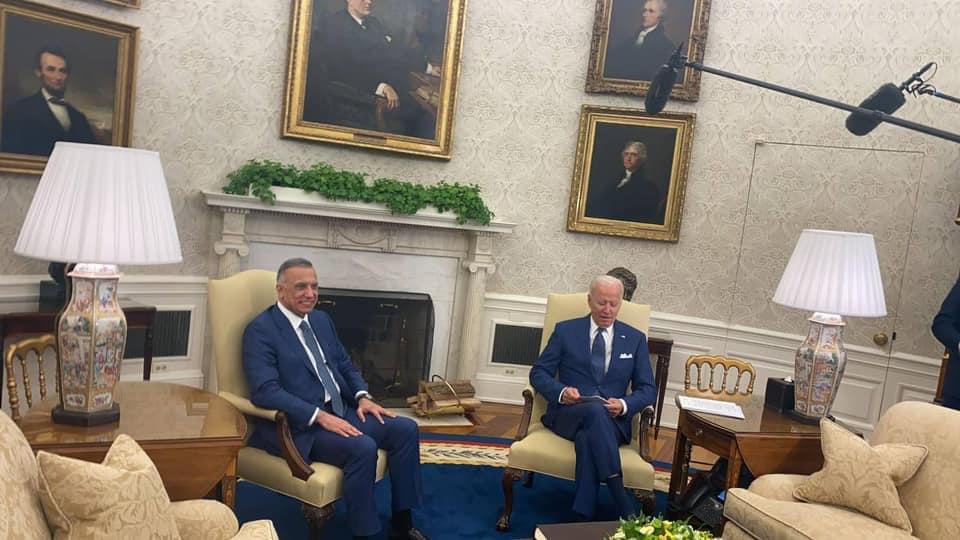
Shafaq News/ The White House meeting between President Biden and Iraqi Prime Minister Mustafa al-Kadhimi was primarily framed around the future of U.S. military forces in Iraq, but in addition to the destabilizing threats of ISIS and Iran-aligned factions, Iraq is also struggling with a deep economic crisis and need for significant political reforms.
Brookings Institution made an Interview with Ranj Alaaldin, a visiting Fellow - Brookings Doha Center Nonresident Fellow - Foreign Policy, Center for Middle East Policy to discuss details about al-Kadhimi’s efforts to address Iraq’s interconnected crises and how the U.S. is still critical to Iraq’s future.
Asked about the meeting between al-Kadhimi and President Biden that was billed as announcing the quote-unquote end of the U.S. combat mission, Alaaldin said, “There’s still a number of details that have to become clearer and I do believe over time they will. Of course, the U.S. has been in a non-combat capacity in Iraq for some time now, if not a number of years. A similar announcement was also made under the Trump administration, and the key announcement during Prime Minister Kadhimi’s visit to the White House was that the U.S. will fully, and I emphasize the word “fully” here, transition to a training, advising, assisting, and intelligence-sharing role, with combat forces out of the country by the end of the year.”
He added, “U.S.-Iraq relations became increasingly eroded, reached their lowest ebb since the 1990s, I would argue, under the previous administration in the U.S. At one point, former President Trump even threatened to impose sanctions on Iraq in response to repeated attacks on U.S. targets in Iraq by Iraqi proxy groups that answer to Iran.” Remarking that, “with this current administration, the Iraqis are hoping for a more delicate, more moderate approach to the country, and understanding that the security climate in Iraq is tied heavily to the domestic political dynamics in Iraq. And within that equation, the Iraqis would argue, or the Iraqi government would argue, is the status, the presence of U.S. forces.”
“Now all this becomes rather complicated because Iraq has a very heavy dependency on the U.S. for the campaign to defeat ISIS. That’s, I guess, in a way, the essence of the relationship itself. U.S.-Iraq relations are particularly important because of the continued threat that ISIS presents. Iraq is of course the arena where ISIS established and declared its so-called caliphate in 2014. It has technically been defeated. It no longer controls territory like it did before and hasn’t done since around 2017, but the group has proven to be rather resilient. It’s ramped up its attacks in recent months and recent weeks, including a very deadly attack in the capital Baghdad last week.” He said.
“I would say, away from the glare of the international media, it’s expanding its reign of terror in other parts of the country, in the north, in the Arab Sunni heartlands, especially where it’s expanding the scope and scale of attacks. That includes things like assassinations, kidnappings, coercing or extorting local communities. And really establishing the infrastructure that would or could potentially at some point, give it an opening, an opportunity to control territory like it did. So that’s why the U.S. is so important to Iraq’s efforts to prevent that from happening.”
Alaaldin concluded that what comes into the picture is that the scenario which came into play under the Trump administration, where the assassination of Qasem Soleimani and Abu Mahdi al-Muhandis, the head of a major Iran-aligned proxy group, Kata’ib Hezbollah, set into motion the, let’s say, intensified demand for the withdrawal of U.S. forces in the country. “Although there was a nonbinding vote in the Iraqi parliament, passed predominantly, if not entirely, by groups that are either very loyal to Iran or that because of their constituencies and support bases had no choice but to support that vote, that set into motion the political momentum domestically.”
He considered Al-Kadhimi as a “transitional prime minister. He came into office because the previous government in Iraq, the previous prime minister, was effectively forced out by a very ferocious protest movement which has demanded greater rights, human rights, demanded accountability in the country, reforms, an end to corruption, and a better standard of living overall. Now that was met with an onslaught by Iran-aligned militias who, to this day, haven’t really answered for the crimes that were committed during that period, where you had around 600-plus Iraqi civilians killed, thousands were wounded.”
“And the legacy of that continues today where you’ve got near-daily human rights atrocities being committed by Iran-aligned militias, kidnappings, and so forth, which also, at the same time itself, is very political. Because what it does is, it undermines Prime Minister Kadhimi, it discredits him, and ultimately creates the kind of environment that is very conducive to an ISIS resurgence because it’s creating grievances, polarization that is very helpful to the organization, but at the same time, is also very conducive to the objectives and interests of Iran-aligned militias.” He said.
The visiting Fellow described the Iraqi trip to Washington “like was designed to try and get, let’s say, some breathing space from the Americans; an effort to ensure that the U.S. doesn’t really retaliate to continued rocket attacks, drone attacks by Iran-aligned militias on U.S. targets in the country in a manner which perhaps would be similar to the confrontational stance that the Trump administration took. So, something proportional from the U.S. side, a response that doesn’t plunge the country into yet another conflict, and which at the same time, can help de-escalate tensions in the region. Because Prime Minister Kadhimi is certainly carving out a role for himself with the support of other political actors in Iraq, whether it’s the president or whether it’s his allies in Erbil, trying to carve out a role where Iraq can play the role of a bridge-builder of sorts in the region, where Iraq effectively becomes a conduit through which to de-escalate tensions between Iran and its rivals but also Iran and the U.S.”
“Now that there are a lot of moving pieces here, and it does ultimately come back to this question of whether the announcement from President Biden and Prime Minister Kadhimi in Washington will be enough to convince Iran and its allies to, I would say, either end their rocket attacks on U.S. bases, U.S. targets in Iraq, on U.S.-aligned actors, like-minded Kurdistan regional government, or at least to reduce the number of these attacks, to reduce and limit the scope and scale of these attacks, and that’s something I think will become apparent over the coming days and weeks, most certainly”.
Talking about the Prime Minister Kadhimi, he said, the Iraqi Prime Minister is “as somebody who is a transitional prime minister, is something of a compromise candidate, has some breathing room amongst the wider Iraqi public, and for them, I would go as far as saying he could be the least worst option as it stands. Because the alternative could be far worse. It could be a militant individual or prime minister tied to Iran, which has been possible in the past, which could become a reality in the future, in the very near future. And the alternative could be a repeat of what unfolded under the previous prime minister, which is effectively carte blanche for Iran-aligned militias to conduct a full-scale campaign of oppression against protesters and the wider public.”
On the Iraqi elections, Alaaldin said there could be a boycott of those elections because of the “intensified campaign to assassinate activists and civilians by Iran-aligned militias, and that boycott will help them very much – that’s Iran and it’s proxies – because they’ve already got an established and entrenched support base that follows, let’s say, more the personalities within those groups. And they’ll be loyal regardless of whether the wider Iraqi public boycotts the elections. And if that boycott happens, the moderates that will suffer, and I would say it’s also Prime Minister Kadhimi that will ultimately suffer and fail to get a second term in office.”
On the continued future of U.S.-Iraq relationship, he pointed out that, “the U.S. has a capacity which it has exercised in Iraq to mobilize international support, whether it’s from other countries’ governments, whether it’s the likes of the World Bank and the IMF, and to mobilize international support and resources towards Iraq’s economic recovery. Sometimes it’s about inspiring confidence and instilling confidence in the Iraqi climate, and the vote of confidence from the U.S. goes a long way towards mobilizing those international resources and support, I would say even regional support. So one of the notable improvements since Kadhimi came into office – and I would say since President Biden came into office – has been this rather significant improvement in Iraq’s relationship with its neighbors, particularly the Arab world, so the likes of Jordan, Saudi Arabia, the UAE, and I think that could become a very important legacy for U.S.- Iraq relations under President Biden and Prime Minister Kadhimi.”
“Element and basis for that relationship outside of the security cooperation. Secondly U.S. support for Iraqi civil society, for the democracy promotion, human rights promotion that unfolds in the country on a daily basis; it’s actually part and parcel of the fabric of the Iraqi society. The U.S. is still a very important player in not just providing or enabling funds for that effort, but of course, at the same time to, let’s say, mobilize NGOs, American and non-American, to ensure they remain invested in the country.” He added.
“I believe President Biden did announce, or at least in one of the announcements, there was an emphasis on continued U.S. support for direct education reforms, the pandemic. I believe the U.S. has already helped the Iraqis mobilize 500,000-plus vaccines in its efforts to combat the pandemic. And of course, support for Iraq’s democracy and the rule of law. So here we’re talking about things like improving the capacity of the judiciary to hold militias and militant groups to account. We’re talking about making sure that the Iraqi moderates, the reformists, the activists, and civil society have a genuine and committed partner on the outside, even if that partner faces restraints and constraints here and there. But I still think the U.S. is particularly critical and crucial to Iraq’s path to recovery. And in the absence of that support, even if it’s symbolic, material support and so forth, Iraq would be in a much darker place right now.”
